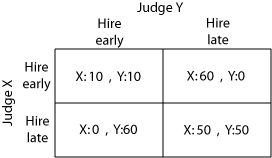LAW CLERK MATCHING GAME
Each year, Federal appellate judges hire law students as clerks for their courts. There are only a limited number of high-quality law clerks available each year. You are a Federal appellate judge and you must make a decision about when to hire your law clerk. Suppose that if all judges hire students at the end of their third years, everyone has a 50-50 chance of getting a good law clerk, and that the odds of getting a good law clerk are the same if everyone hires students at the end of their second years. However, if you hire your law clerk at the end of the studentsí second year, you are sure to get a good law clerk. But if you hire at the end of the third year and all the other judges are hiring at the end of the second year, you have no chance of hiring a good clerk. The same possibilities apply to the other judges. Hiring at the end of the third year has no cost to you. Hiring at the end of the second year is more costly because you have fewer signals (grades, internships, etc.) to make sure that the clerk you hire really is good and thus must do some extra investigative work. You would be willing to pay $40 to avoid having to do this investigative work. A 50-50 chance of hiring a good law clerk is worth $50 to you and a 100 percent chance of hiring a good law clerk is worth $100. Other judges value these outcomes just as you do.
The game you will play is the same as the one shown below:

To simplify the game, we will pair each student with only one other student. Each "judge" in the class can choose one of two possible actions: hire early (at the end of the studentsí second year) or hire late (at the end of the studentsí third year) .
You will make your decision by clicking on your action choice on the game table.

